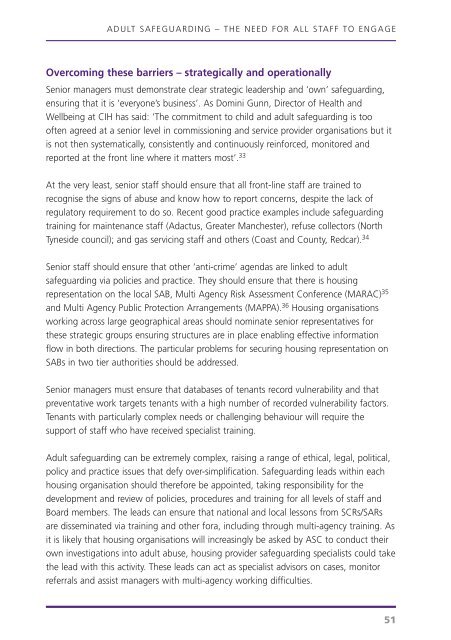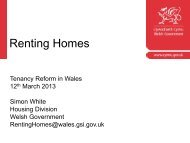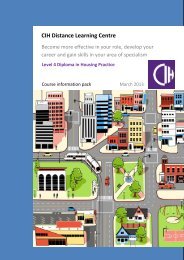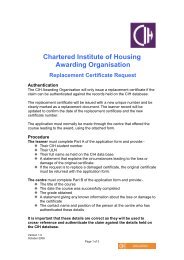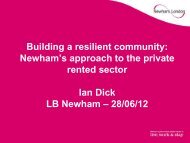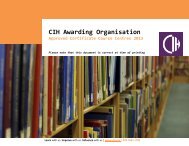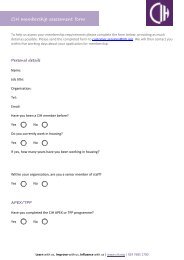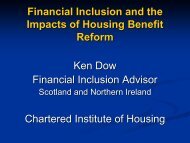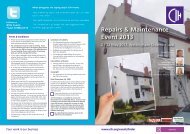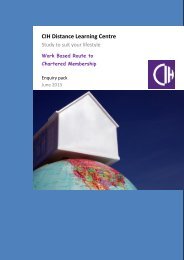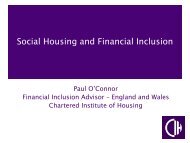View publication - Chartered Institute of Housing
View publication - Chartered Institute of Housing
View publication - Chartered Institute of Housing
You also want an ePaper? Increase the reach of your titles
YUMPU automatically turns print PDFs into web optimized ePapers that Google loves.
ADULT SAFEGUARDING – THE NEED FOR ALL STAFF TO ENGAGE<br />
Overcoming these barriers – strategically and operationally<br />
Senior managers must demonstrate clear strategic leadership and ‘own’ safeguarding,<br />
ensuring that it is ‘everyone’s business’. As Domini Gunn, Director <strong>of</strong> Health and<br />
Wellbeing at CIH has said: ‘The commitment to child and adult safeguarding is too<br />
<strong>of</strong>ten agreed at a senior level in commissioning and service provider organisations but it<br />
is not then systematically, consistently and continuously reinforced, monitored and<br />
reported at the front line where it matters most’. 33<br />
At the very least, senior staff should ensure that all front-line staff are trained to<br />
recognise the signs <strong>of</strong> abuse and know how to report concerns, despite the lack <strong>of</strong><br />
regulatory requirement to do so. Recent good practice examples include safeguarding<br />
training for maintenance staff (Adactus, Greater Manchester), refuse collectors (North<br />
Tyneside council); and gas servicing staff and others (Coast and County, Redcar). 34<br />
Senior staff should ensure that other ‘anti-crime’ agendas are linked to adult<br />
safeguarding via policies and practice. They should ensure that there is housing<br />
representation on the local SAB, Multi Agency Risk Assessment Conference (MARAC) 35<br />
and Multi Agency Public Protection Arrangements (MAPPA). 36 <strong>Housing</strong> organisations<br />
working across large geographical areas should nominate senior representatives for<br />
these strategic groups ensuring structures are in place enabling effective information<br />
flow in both directions. The particular problems for securing housing representation on<br />
SABs in two tier authorities should be addressed.<br />
Senior managers must ensure that databases <strong>of</strong> tenants record vulnerability and that<br />
preventative work targets tenants with a high number <strong>of</strong> recorded vulnerability factors.<br />
Tenants with particularly complex needs or challenging behaviour will require the<br />
support <strong>of</strong> staff who have received specialist training.<br />
Adult safeguarding can be extremely complex, raising a range <strong>of</strong> ethical, legal, political,<br />
policy and practice issues that defy over-simplification. Safeguarding leads within each<br />
housing organisation should therefore be appointed, taking responsibility for the<br />
development and review <strong>of</strong> policies, procedures and training for all levels <strong>of</strong> staff and<br />
Board members. The leads can ensure that national and local lessons from SCRs/SARs<br />
are disseminated via training and other fora, including through multi-agency training. As<br />
it is likely that housing organisations will increasingly be asked by ASC to conduct their<br />
own investigations into adult abuse, housing provider safeguarding specialists could take<br />
the lead with this activity. These leads can act as specialist advisors on cases, monitor<br />
referrals and assist managers with multi-agency working difficulties.<br />
51


